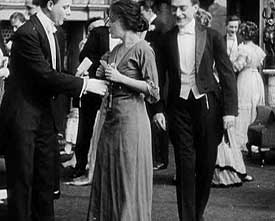 Based on the O. Henry story "The Halberdier of the Little Rehmschloss," Thirty Days at Hard Labor (1912) is a quarter-hour romantic comedy that opens at a dance where two gents are vying for the attentions of a single woman, Beatrice (Mary Fuller).
Based on the O. Henry story "The Halberdier of the Little Rehmschloss," Thirty Days at Hard Labor (1912) is a quarter-hour romantic comedy that opens at a dance where two gents are vying for the attentions of a single woman, Beatrice (Mary Fuller).
Love is awakened between her & one of the two gents, namely Jack (Harold M. Shaw). However, her father (Robert Bower) resents the young man as a member of the idle rich, when he himself built a fortune by sweat & ingenuity.
He will permit the marriage only if the young man can manage to make a living for thirty days without being "discharged for incompetence." During that thirty days he agrees to have no contact with Beatrice.
Jack has no need to work & at first refuses the bargain, but finally agrees, & sets off without a farewell to Beatrice to attempt an independent living. Her father pretends not to know why her beau left so quickly & is unseen for for a month.
This is rather cruel of her father, for his daughter watches the mails daily for some explanation to arrive.
The young man first attempts ditch-digging. When his hands are blistered, he quits. He then tries breaking rocks with a company that is laying cable, which is physically just as impossible for him. His third job attempt is shoveling coal, at which he lasts no time at all.
Finally he finds a job as "a halberdier," which means he has to wear a suit of armor & carry a halberd to advertise a restaurant called the Little Rheinschloss. An easy job at last!
On the last of the thirty days, Beatrice, her father, mother, & the second suitor whom dad prefers, all show up at the restaurant. It is only three more minutes before Jack has lived up to his bargain. With his vizer down, Beatrice does not know the armored waiter is Jack, though her father recognized him.
As the last few minutes tick down, Beatrice is unusually picky about everything, & Jack becomes clumsier by the minute out of nervousness. But before anything can go awry to get him fired, the cuckoo clock sounds the hour that the contract is completed. All is revealed to Beatrice, whose second suitor has to sit looking totally cheezed off.
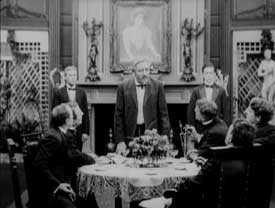 At a men's party for the bridegroom (George Lessey), he receives a note from his friend Jim apologizing for missing the bash, but he had to leave town immediately, concluding "Perhaps you & your bride will like to have this portrait of your mother." The portrait is soon hung over the fireplace, showing a beautiful woman indeed.
At a men's party for the bridegroom (George Lessey), he receives a note from his friend Jim apologizing for missing the bash, but he had to leave town immediately, concluding "Perhaps you & your bride will like to have this portrait of your mother." The portrait is soon hung over the fireplace, showing a beautiful woman indeed.
The various gents take seats together, but Jim's seat is empty. For a lark, they decide to ask the first man who passes by to join them, taking Jim's empty seat, hence the film's title The Passer-by (1912).
Two of the fellows go into the street & return with an older & reluctant stranger (Marc MacDermott, turning in quite a fine naturalistic performance).
Forcing their companionship upon Jack, he joins their toasts. After a couple of drinks he is successfully imposed upon to tell his story.
The camera closes in dramatically upon his sad face, & suddenly he's younger, at a bachellor party among close companions. His beloved Lucille sends a note which not only withdraws from their marriage planned for the following day, but reveals that she has this hour married Hamilton Crawford.
From that day on, his life was sorrow. He thought to devote his life to no family, but only to amassing wealth. Flashbacks to the the stock exchange floor are wonderfully dramatic.
Jack's opponent in cornering a certain market was the very Hamilton who won away his bride. And that fortunate man won this time, too, bankrupting Jack who in consequence ended up with a humble clerk's position. Even this job goes badly when he cannot stop himself dwelling on his loss.
Somberly told, but in the end not very convincing, as the story concludes upon the unlikely coincidence of the recently hung portrait having been one & the same with the passer-by's lost love (Miriam Nesbitt).
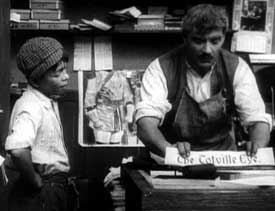 The Totville Eye (1912) is set in the composing room & office of the titular newspaper. Printer Scotty (Walter Edwin) suggests to the editor Thomas Adams (Robert Brower) a revamping of the front page, to look more modern, but the editor has no interest in change.
The Totville Eye (1912) is set in the composing room & office of the titular newspaper. Printer Scotty (Walter Edwin) suggests to the editor Thomas Adams (Robert Brower) a revamping of the front page, to look more modern, but the editor has no interest in change.
An unemployed printer (Edward O'Connor) tries for a job but is turned away by Adams, though Scotty slips him a hand-out. (As an aside, newspapers of the time could always use an extra man to sort type; it paid poorly, but it was guaranteed work for newspapermen willing to do it, so the film's assumpton that an editor would offhandedly turn a skilled man away is false. But in this case, the unemployed printer turns out to be a drunkard so it's just as well Adams didn't take him in even for the gruntwork.)
Adams received a telegram calling him immediately to New York. Scotty's left in charge, his only helper a kid, Sammy (Yale Boss). Sammy failed to tighten the finished typeset pages properly before Scotty lifted the heavy lead type, which collapses into a heap.
There were no written copies of the stories prepared, so this is doubly a catastrophe, Adams being absent & unable to dictate contents. Sammy takes paper & pencil & heads off to look for some quick news.
The boy spots the minister (Bigelow Cooper) at the village drug store ordering soda water. The drunken unemployed man for a lark poors some of his liquor in the soda water while Reverend Peeble is unaware. Sammy is tickled to see the minister gets drunk & follows him for a while so as to report on his tipsy encounters.
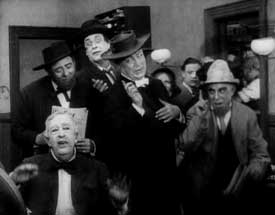 The boy hurries back to the newspaper to report that the minister went on a bender, & while Scotty typesets that story, Sammy then heads out to spy on a pair of lovers Tom & Flossie (Harry Beaumont & Bessie Learn). The boy hurries back to the newspaper to report that the minister went on a bender, & while Scotty typesets that story, Sammy then heads out to spy on a pair of lovers Tom & Flossie (Harry Beaumont & Bessie Learn).
He also peers in at an office window & gets a report about "a hard-hearted landlord" (Charles Ogle) being menacing toward a struggling tenant (Bliss Milford). With three gossipy articles, the lost front page can be replaced, & Scotty seems not to mind the nature of the cub reporter's stories. The next morning, the paper is issued.
The church trustees have several reports that the minister was drunk & he's in deep trouble. Then the newspaper arrives reporting that the reverand Mr. Peeple had never tasted liquor before & when a stranger put whiskey in the man's soda, he drank it not knowing why it tasted different. The church trustees are highly amused by the explanation, & now see how innocent their minister was in the matter.
The heartless landlord sees the headline about "our richest citizen": "Hard-Fisted Squire Jenkins evicts Poor Widow Dugan," with only the poorhouse left for her. Seeing himself described for the first time as others see him, he repents of his heartless nature.
Tom reads in the paper about breaking up with Flossie after a six month engagement. Flossie sees the same report, & they are soon re-united in their desire to have the story corrected. Scotty quickly does a second editon insisting Tom & Flossie have made up, & so they do.
The editor returns the next morning to see an edition that had nothing to do with the one he okayed before leaving for New York. He's very angry at Scotty but one by one the people whose lives were improved by the stories come through the office thanking the editor for a job well done. An amusing quarter-hour film overall.
copyright © by Paghat the Ratgirl
|
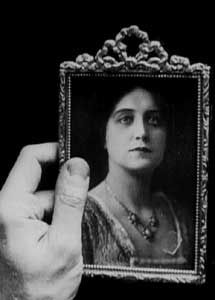



 The boy hurries back to the newspaper to report that the minister went on a bender, & while Scotty typesets that story, Sammy then heads out to spy on a pair of lovers Tom & Flossie (Harry Beaumont & Bessie Learn).
The boy hurries back to the newspaper to report that the minister went on a bender, & while Scotty typesets that story, Sammy then heads out to spy on a pair of lovers Tom & Flossie (Harry Beaumont & Bessie Learn).